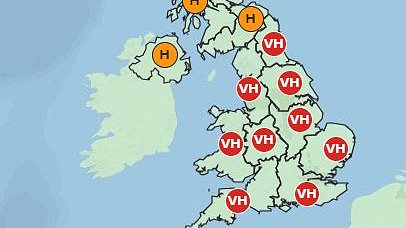The Met Office has issued a red alert warning as pollen levels are expected to be ‘very high’ this weekend.
Eight out of nine regions in England will see the highest pollen alert level today, according to an interactive tool on the Met Office website.
The north east of England is the only region where pollen levels will be amber. or ‘high’ on Saturday.
Sunday will see most of the UK facing medium or high alerts, while very high warnings will remain in place for London and the South East of England, the East, the West Midlands and the East Midlands.
Northern Scotland, meanwhile, will be on a low alert for pollen tomorrow.
Medium and high alerts will remain next week.
On Wednesday, most of the UK will be on high alerts, except for the Scottish Highlands region and Yorkshire & Humber.
West Midlands, however, will remain on a red alert for pollen levels.
The weather service predicts pollen counts using specialised instruments combined with data about the weather, which can have a big effect on the production, distribution and dispersion of pollen.
‘Hay fever symptoms usually appear when the pollen count, which is a measure of the number of grains of pollen in one cubic metre of air, exceeds 50,’ it says.
‘A count of 50 pollen grains or less is considered low whilst anything above 1,000 is deemed high.’
Met Office’s online pollen forecast continuously provides a snapshot of pollen forecasts for five days ahead across the whole of the UK.
The pollen warning comes as temperatures across the UK are set to drop after they were in the twenties on Friday.
London enjoyed a temperature of 22C yesterday afternoon, according to the Met Office, while parts of the southeast and southwest basked in 20C sunshine.
The temperatures have been considerably higher than the average of around 13C for this time of the year.
But the warmer weather has been short-lived, with the Met Office forecasting temperatures to drop below 20C today.
At 1pm today, London’s twhile the temperature in Manchester will hit a high of 19C.
South West England and Wales, meanwhile, expect a maximum temperature of 14C.
In northern Scotland, the temperature is expected to plunge to 10C.
The temperature across the UK on Sunday will be even lower.
London will experience a maximum temperature of 16C, while areas of Wales and Northern Ireland will drop to 10C or lower.
Areas of Scotland will reach a high of 11C, but it will get as cold as 8C further north.
Wednesday will see the coldest temperatures across the UK as a whole, with the maximum temperature for London forecasted to be 13C.
Pollen is made up of tiny particles which are released by plants and trees as part of their reproductive cycle.
This extremely fine powder is spread by insects and the wind – and is easily inhaled by humans.
For those with a pollen allergy (hay fever), pollen triggers the antibody immunoglobulin E, which creates mucus and leads to symptoms such as congestion and sneezing.
There is no cure for hay fever, but many people find their symptoms improve as they get older.
